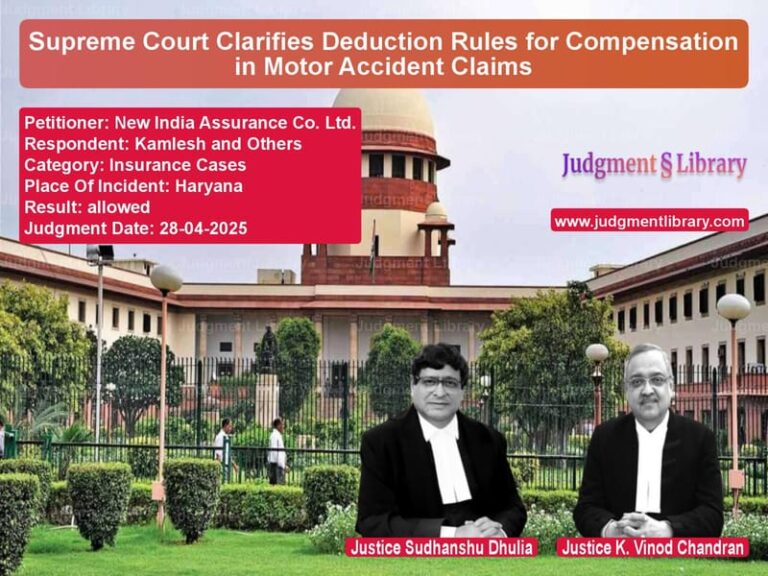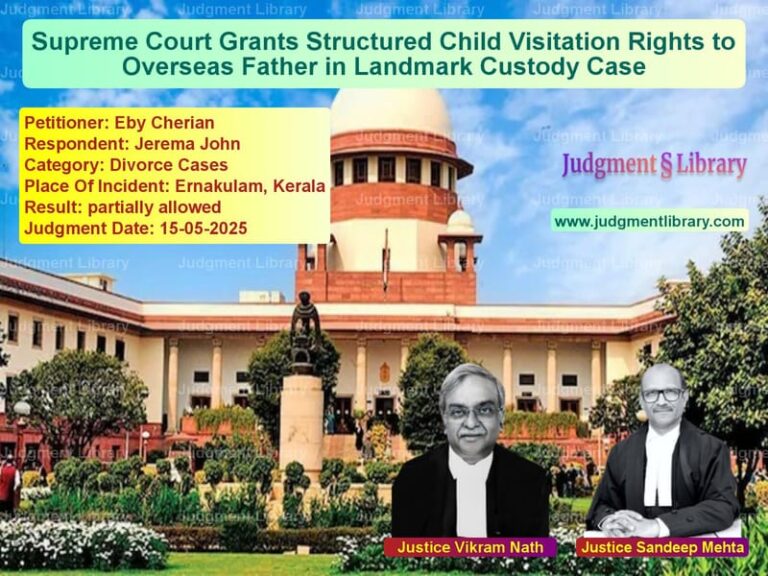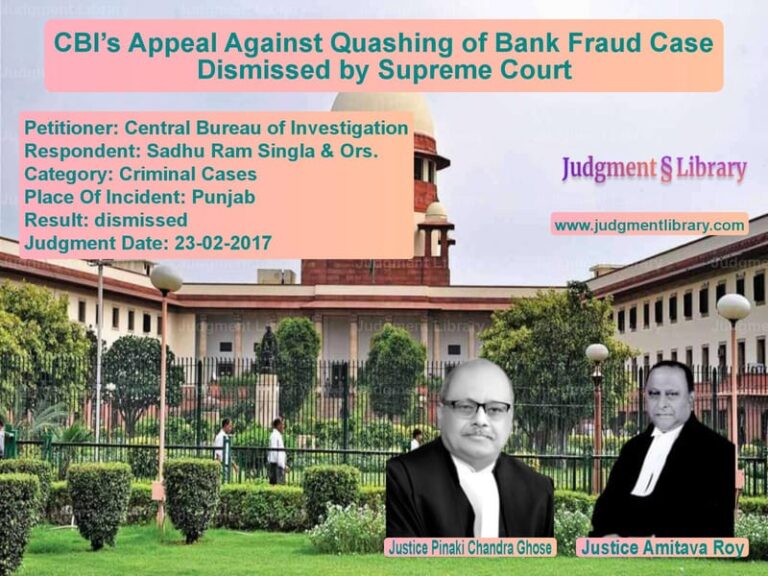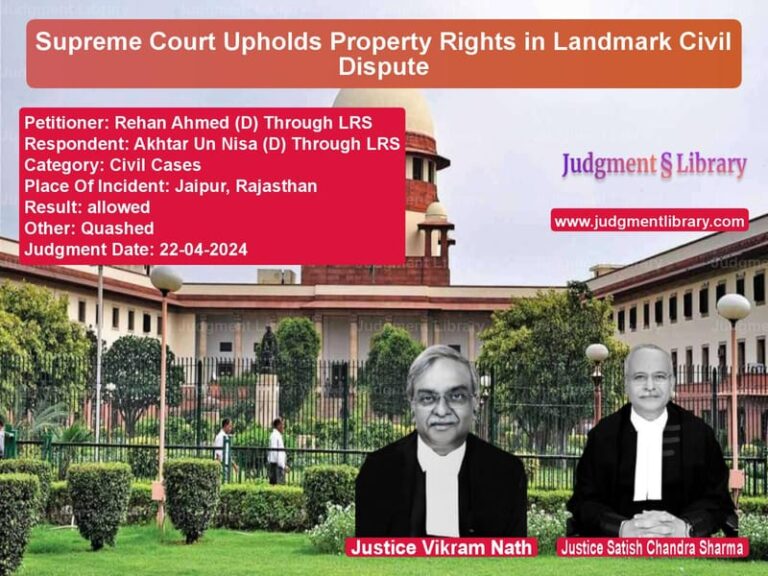High Court’s Bail Order Set Aside in Murder Case: Supreme Court’s Ruling in Sunita Devi vs. State of Bihar
The case of Sunita Devi vs. State of Bihar & Another is a significant ruling under the Criminal Procedure Code (CrPC), 1973, concerning the suspension of sentence and the procedural safeguards in bail matters. The Supreme Court examined whether the Patna High Court correctly granted bail to a convict sentenced under Section 302 IPC without following the mandatory procedure under Section 389 CrPC.
Background of the Case
The appellant, Sunita Devi, was the de facto complainant in a murder case where the accused was convicted under Section 302 IPC. The Patna High Court granted bail to the convict without recording any reasons or considering objections from the State.
The key events leading to the Supreme Court proceedings:
- Trial Court Conviction: The second respondent was convicted under Section 302 IPC and sentenced to life imprisonment.
- Patna High Court Bail Order (July 12, 2016): The High Court, in Interlocutory Application No. 1630 of 2015, suspended the convict’s sentence and granted bail.
- Appeal to Supreme Court: The de facto complainant, Sunita Devi, challenged the High Court’s order on the ground that mandatory requirements under Section 389 CrPC were not followed.
Key Legal Issues
- Whether the High Court was correct in granting bail without assigning reasons.
- Whether the High Court followed the procedure under Section 389 CrPC before suspending the sentence.
- Whether the convict’s bail should be revoked pending the final disposal of the appeal.
- Whether the High Court’s order impacted public confidence in the judiciary.
Arguments by the Parties
Arguments by the Appellant (Sunita Devi)
- The High Court failed to comply with the mandatory procedure under Section 389 CrPC while granting bail.
- The High Court should have first given an opportunity to the Public Prosecutor to file objections.
- The bail order lacked judicial reasoning and did not consider the seriousness of the offense.
Arguments by the Respondent (State of Bihar)
- The prosecution was not given an opportunity to present its objections before the High Court.
- The High Court did not apply its mind while granting bail to a convict in a murder case.
- Suspension of sentence in a serious offense like murder should be done cautiously.
Supreme Court’s Observations
On the Mandatory Procedure Under Section 389 CrPC
- “The appellate court, if inclined to consider the release of a convict sentenced to imprisonment for life, shall first give an opportunity to the Public Prosecutor to show cause in writing against such release.”
- “The High Court did not follow the settled principles before granting bail.”
On the Requirement of a Reasoned Order
- “An order granting bail in a serious offense like murder should contain specific reasons and judicial application of mind.”
- “The order must consider the impact on public confidence in the justice system.”
On the High Court’s Error
- “The High Court’s order granting bail is set aside and remitted for fresh consideration.”
- “The High Court is directed to decide the bail application afresh, following the mandatory procedure under Section 389 CrPC.”
Supreme Court’s Final Judgment
The Supreme Court set aside the High Court’s bail order and directed:
- The High Court must decide the bail application afresh within three months.
- The second respondent shall remain on interim bail for three months.
- The prosecution must be given an opportunity to file objections.
Legal Significance of the Judgment
This ruling establishes key legal principles:
- Mandatory Compliance with Section 389 CrPC: Courts must follow due process when considering bail applications for serious offenses.
- Reasoned Orders in Bail Cases: The judgment clarifies that bail orders must contain specific reasons.
- Judicial Accountability: The ruling reinforces that courts should ensure transparency in suspending sentences.
Conclusion
The Supreme Court’s decision in Sunita Devi vs. State of Bihar underscores the importance of following due process while granting bail in serious offenses. By setting aside the High Court’s order, the ruling ensures that judicial discretion in bail matters is exercised with caution, maintaining public confidence in the judiciary.
Don’t miss out on the full details! Download the complete judgment in PDF format below and gain valuable insights instantly!
Download Judgment: Sunita Devi vs State of Bihar & Ano Supreme Court of India Judgment Dated 18-01-2018.pdf
Direct Downlaod Judgment: Direct downlaod this Judgment
See all petitions in Bail and Anticipatory Bail
See all petitions in Murder Cases
See all petitions in Judgment by Kurian Joseph
See all petitions in Judgment by Amitava Roy
See all petitions in allowed
See all petitions in Remanded
See all petitions in supreme court of India judgments January 2018
See all petitions in 2018 judgments
See all posts in Criminal Cases Category
See all allowed petitions in Criminal Cases Category
See all Dismissed petitions in Criminal Cases Category
See all partially allowed petitions in Criminal Cases Category







